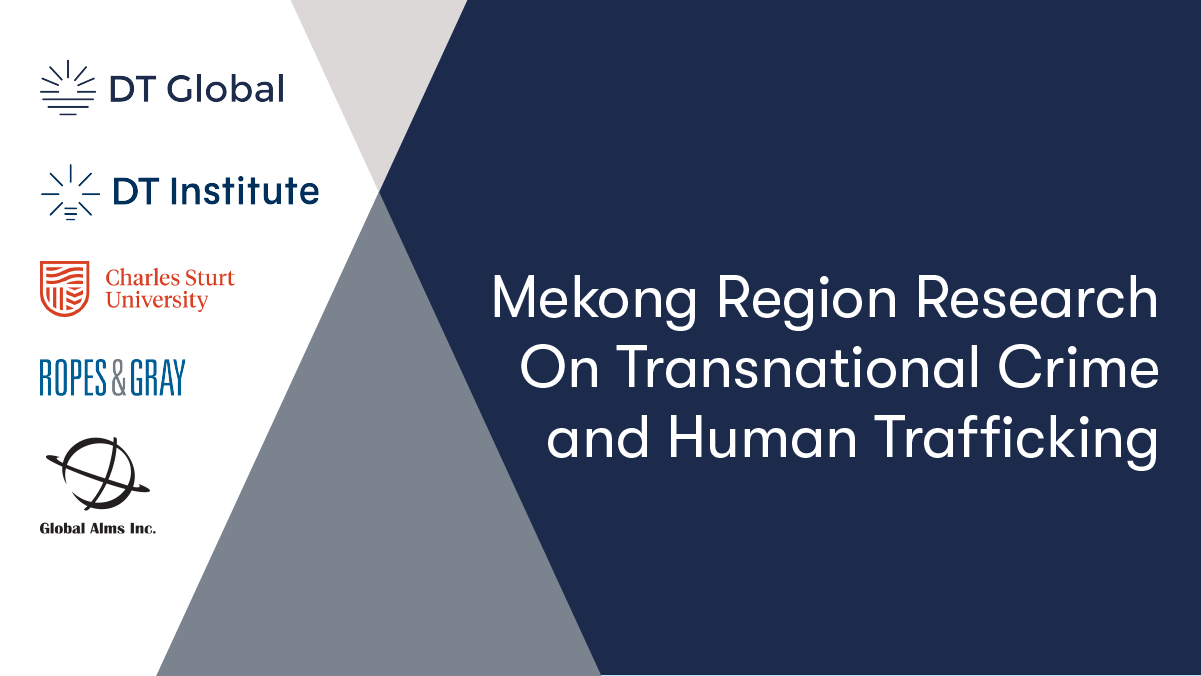
From the time that DT Global and DT Institute were launched in 2019, we have embraced “Profit for Purpose” as a core value driving the thoughts, actions, and programming of the DT Global family. A year into forging a new way of doing business, what does Profit for Purpose tangibly look like?
There are a handful of words and phrases that find their way into conversations of those who are working to operationalize the profit for purpose mantra—examples include “catalytic” and “aligned,” to name a few. But sometimes the best way to communicate something is through an example.
DT Global implements projects across the international development space, including several that provide development services in the law and justice sector. Steven Baker, a technical expert at DT Global Australia, was interested in developing research that shed light on the gateways to transnational and serious organized crime (TNC) in the Asia Pacific region and the impact of an emerging COVID pandemic on illicit markets and governance. Simultaneously, Christina Storm, who leads DT Institute’s Rule of Law practice, and Hugh Doyle, DT Institute’s Chief Executive, were eager to identify opportunities to develop programming to combat human trafficking globally.

We quickly realized that this could be the perfect scenario to put our Profit for Purpose commitment to the test.
Charles Sturt University, an Australian university with a global reputation as a leading provider of specialist professional programs in policing, law, criminology, security, emergency management, customs and excise studies, and border management, was interested in collaborating with DT Global following previous successful interactions with DT Global’s Asia Pacific Managing Director, Frank Maiolo. This relationship is demonstrative of DT Global’s focus on nurturing deep long standing partnerships with the world’s best organizations for impact. Meanwhile, DT Institute had cultivated strong relationships with international law firms such as Ropes and Gray, specifically its Hong Kong office, which had expressed interest in providing pro bono lawyer research on issues related to human trafficking in Asia. Finally, a fifth collaborating partner, Global Alms, a CSO operating on the Thailand-Myanmar border supporting TNC victims, was brought in by Charles Sturt University to provide lived operational experiences and views of actors working in the region.
What we aimed to do was build a coalition of like-minded parties with technical and research capabilities, able to create impact and benefit. We started simply by talking. The first conversation between the partners took place in May 2020. Funding arrangements and in-kind contributions were agreed for a collaborative research project.
Those early conversations further raised the specter of COVID-19 and its impact on programming design, the pace at which policy could keep up with the behavioral changes of criminal groups, and the operational capacities of prevention, prosecution and protection agencies. One question was on the “collaborators” minds:
What impact would a once-in-a-century global pandemic have on a crime that depended upon exploiting human vulnerabilities and mastering movement of people and illicit commodities?

The collaborating parties realized that tackling this topic halfway through 2020, with all of its once-in-a-lifetime complications, was going to present a unique opportunity to examine issues about which little had yet been written or studied. The team recognized that the collaboration could contribute to the literature of human trafficking and other elements of transnational crime in a way that had the potential to be ground-breaking. With traffickers already deploying work-arounds to border closures as local economies were in crisis, experts agreed on one thing: At no time in modern history would there be more individuals ripe for exploitation than there would be in the wake of this pandemic. And yet, the COVID pandemic also presented opportunities through the establishment of improved systems of cooperation and border control.
Fast-forward to November 2020: the research is entering its final stage, with a focus on the Mekong region countries (Thailand, Myanmar, Vietnam, Cambodia and Laos). The final product combines analysis of relevant policies and local country plans, assembles published data collected from actors in the region, and reports on the TNC challenges, constraints, and obstacles for government agencies and the private sector in the greater Mekong area. It includes early COVID-related findings, as well as anticipated complications and changes resulting from the COVID pandemic that are still unfolding. Its recommendations include homing in on the ‘conditional vulnerabilities’ generated by domestic violence, the increase in vulnerability to children with the surge in internet usage, and labor vulnerabilities, especially for men, sourced to the depletion of employment opportunities across the globe. Finally, it suggests areas where policies will want to shift greater resources and attention in the face of these anticipated vulnerabilities and exploitations. Our research findings and the report itself will be “open sourced” and available for anyone and everyone to use for benefit in the public domain.
We hope that this research will be a welcomed contribution to the emerging body of literature and discussion regarding TNC and the impacts of COVID and will be of use for future programming and work in the region — increasing our impact and improving lives of vulnerable populations throughout the Mekong.
We are proud of how we have leveraged our profits to invest in communities and thought leadership to create a seminal work. This report will be made available to the public in November 2020.